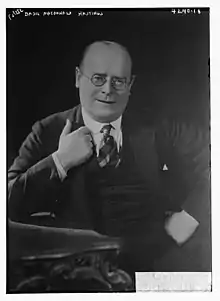Basil Macdonald Hastings | |
|---|---|
 Hastings circa 1927 | |
| Born | 20 September 1881 Southwark, London, England |
| Died | 21 February 1928 (aged 46) Southwark, London, England |
| Occupation(s) | Author, journalist, and playwright |
| Children | Macdonald Hastings |
Basil MacDonald Hastings (20 September 1881 – 21 February 1928) was an English author, journalist, and playwright.[1]
Early life and education
Hastings was born on 20 September 1881 in London, second son of solicitor S. J. Edward Hastings. He was educated at Stonyhurst and King's College London.[2][3] His nephew- son of his elder brother, Major Lewis Aloysius Macdonald Hastings (1880-1966), a farmer in Southern Rhodesia, where he had been a diamond prospector, political organizer, and served in the Cape Mounted Police- was the politician Stephen Hastings.[4][5]
Career
Hastings was on the War Office staff for eight years before being appointed assistant editor of The Bystander, where he remained for three years. During the First World War, Hastings served as a second lieutenant in the Royal Flying Corps, having previously been a corporal in the King's Royal Rifle Corps; he founded and edited the RAF journal, The Fledgling (later Roosters and Fledglings).[6][7] Hastings was a friend, collaborator, and regular correspondent of Joseph Conrad. Hastings produced a successful adaptation of Conrad's novel Victory performed at the Globe Theatre in London in 1919.[8][9] By this time, Hastings had "already written several plays and collaborated on two others with Eden Phillpotts".[10] Hastings's best-known play, The New Sin (1912), "had some success on the London stage".[11]
He died on 21 February 1928 in London after a "lengthy illness", at age 46.[1][12]
Personal life
Hastings married Wilhelmina ("Billie") Creusen White, of a Catholic family from Peckham, South London, some of the members of which subsequently "developed social pretensions" and treated her with condescension, according to her grandson Max Hastings.[13] They had a son- journalist and author (Douglas Edward) Macdonald Hastings (father of the journalist, author and historian Max Hastings)- and a daughter.[14]
References
- 1 2 "Basil MacD. Hastings. Playwright Dies at 46, Aware of Doom, but Always Was Cheerful". The New York Times. Associated Press. February 22, 1928. Retrieved 2015-09-09.
- ↑ Who's Who, 74th edition, vol. 1, ed. Henry R. Addison et al, A. & C. Black, 1922, p. 1219
- ↑ The Catholic Who's Who, vol. 20, ed. F. C. Burnand, Burns & Oates, 1927, p. 217
- ↑ Did You Really Shoot The Television? A Family Fable, Max Hastings, HarperCollins Publishing, 2010
- ↑ Oxford Dictionary of National Biography 2005-2008, ed. Lawrence Goldman, Oxford University Press, 2013, p. 493
- ↑ Who's Who, 74th edition, vol. 1, ed. Henry R. Addison et al, A. & C. Black, 1922, p. 1219
- ↑ Who was Who, St Martin's Press, 1929, p. 474
- ↑ Joseph Conrad: Interviews and Recollections, ed. Martin Ray, University of Iowa Press, 2010, p. 224
- ↑ Hand, Richard J. (2009). "Conrad's "Victory": The Play and Reviews". Conrad Studies. 4: iii–219. JSTOR 44869431.
- ↑ The Selected Letters of Joseph Conrad, Joseph Conrad, ed. Laurence Davies, Cambridge University Press, 2015, p. 523
- ↑ "Hastings, Basil Macdonald". Oxford Reader's Companion to Conrad. Oxford University Press. January 2011. ISBN 978-0-19-860421-1.
- ↑ Who was Who, St Martin's Press, 1929, p. 474
- ↑ Did You Really Shoot The Television? A Family Fable, Max Hastings, HarperCollins Publishing, 2010
- ↑ Who's Who, 74th edition, vol. 1, ed. Henry R. Addison et al, A. & C. Black, 1922, p. 1219